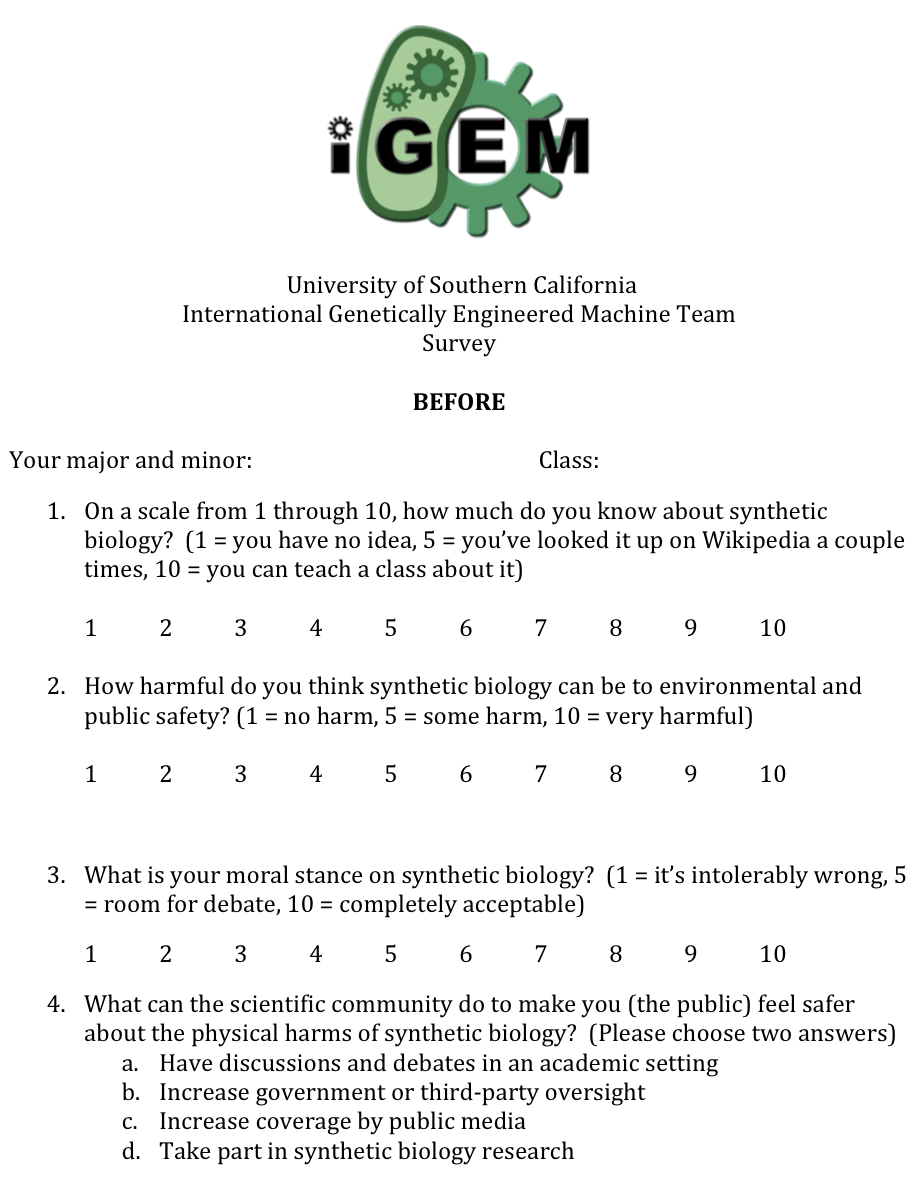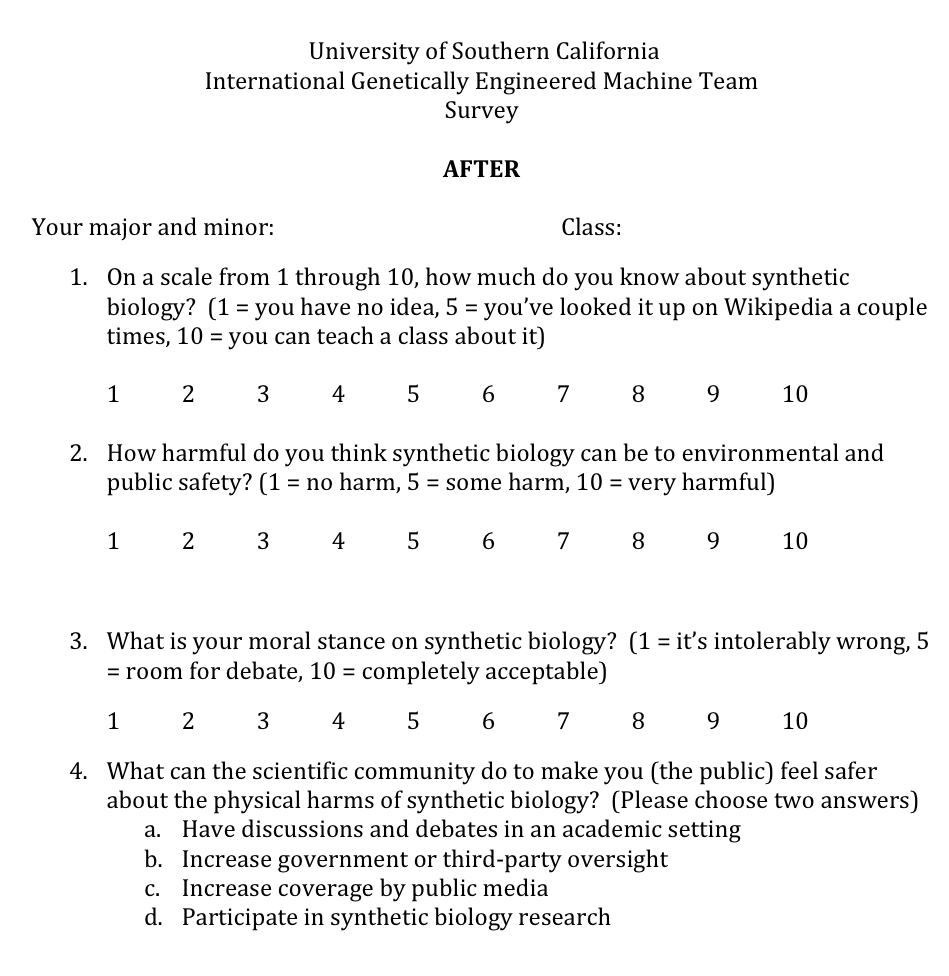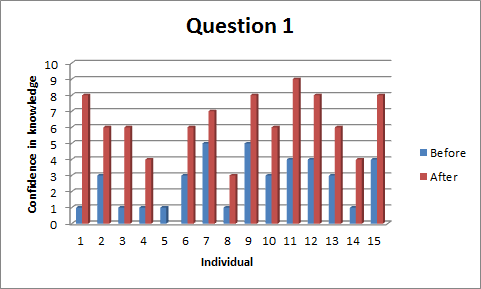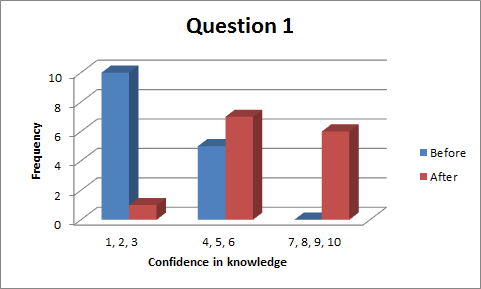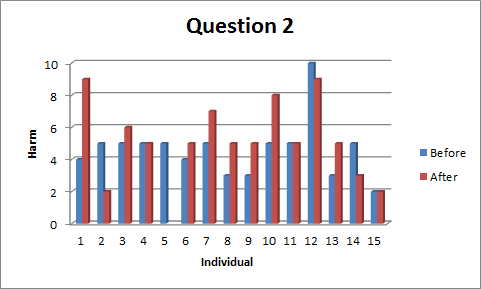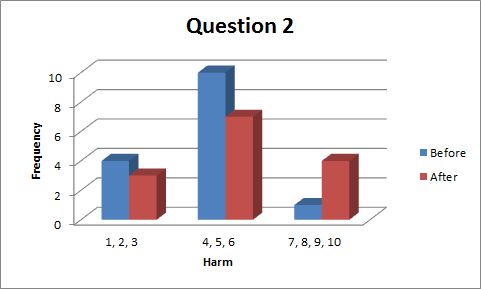Team:USC/Human Outreach
From 2011.igem.org
(→Results & Discussion) |
(→Question 1) |
||
| Line 82: | Line 82: | ||
The top chart for each question shows each individual attendee's change from before the discussion to after the discussion. The bottom chart for each question shows the frequency of a certain response range (eg. 1-3, 4-6, 7-10). | The top chart for each question shows each individual attendee's change from before the discussion to after the discussion. The bottom chart for each question shows the frequency of a certain response range (eg. 1-3, 4-6, 7-10). | ||
| - | === '''Question 1'''=== | + | === '''Question 1''' === |
| - | On a scale from 1 through 10, how much do you know about synthetic biology? | + | On a scale from 1 through 10, how much do you know about synthetic biology? (1 = you have no idea, 5 = you've looked it up on Wikipedia a couple of times, 10 = you can teach a class about it) |
| + | [[File:Question1(confidence in knowledge).png|200px|thumb|right]] [[File:Question1(frequency).png|200px|thumb|right]] The charts to the right show the attendees' confidence in their knowledge about synthetic biology. Prior to the discussion each person was below a 5 (taken a quick peak at the Wikipedia page of synthetic biology). After the discussion, each person's confidence in their knowledge about synthetic biology grew by at least three. By looking at the frequency chart, people's responses are pooled within the range of 1 - 3, meaning most people had minimal to no knowledge about synthetic biology. After our discussion, the pooling of responses occurs in the higher two ranges. The before and after responses show a clear correlation that people's understanding and their confidence in their understanding of synthetic biology grew because of the discussion they participated in. | ||
| - | + | ||
| + | |||
| + | |||
| + | |||
| + | |||
| + | |||
| + | |||
| + | |||
| + | |||
| + | |||
| + | |||
| + | |||
| + | |||
| + | |||
| + | |||
| + | |||
| + | |||
| + | ---- | ||
| + | |||
| + | === '''Question 2''' === | ||
| + | |||
| + | How harmful do you think synthetic biology can be to environmental and public safety? (1 = no harm, 5 = some harm, 10 = very harmful) | ||
| + | |||
| + | [[File:Question2(harm).png|200px|thumb|right]] [[File:Question2(frequency).png|200px|thumb|right]] The charts to the right show the attendees' perceptions of harm in the spheres of the environment and public safety. Prior to the discussion each person's perception of the harm that could be perpetrated by synthetic biology was minimal - this could be in part that most attendees did not understand the goals of synthetic biology and what the practice of synthetic biology entails (synthetic biology is not evil!!!) After our discussion, to our surprise, on average, people's perceived potential harm that synthetic biology could perpetrate actually increased! Our discussion, though focused on beneficial uses and practices, such as agriculture, novel antibiotic generation, and iGEM did inevitably focus on negative aspects of synthetic biology, such as bioterrorism, environmental contamination of mutated organisms, potential for eugenics, and reduction of genetic diversity. It became evident that these are concerns that the public, whether educated or not educated about synthetic biology, have in regards to its practice and rapid progression. | ||
| + | |||
| + | |||
| + | |||
| + | |||
| + | |||
| + | |||
| + | |||
| + | |||
| + | |||
| + | |||
| + | |||
| + | |||
| + | |||
| + | |||
| + | |||
| + | ---- | ||
| + | |||
| + | === '''Question 3''' === | ||
| + | |||
| + | What is your moral stance on synthetic biology? (1 = it's intolerably wrong, 5 = room for debate, 10 = completely acceptable) | ||
Revision as of 08:35, 28 September 2011
|
|
||||
 |
||||
| ||||
OverviewAlthough most iGEM members fully understand the concepts that drive synthetic biology, especially after applying our knowledge during summer research, we often forget how ignorant we were of such topics before learning about them in class or even through iGEM. Caught up in our own excitement of “doing science,” many of us do not consider the public’s awareness of synthetic biology and its ethical or physical implications. Even our own iGEM members often fail to realize the global or moral effects of synthetic biology on a broader scope. The truth, however, is clear - synthetic biology is controversial. And we as the executors of synthetic biology, must educate the general public of the benefits and potential doubts of our research so the public can take an informed stance on the issues of synthetic biology. GoalTo spread an understanding of what synthetic biology is and awareness of the advances and their socio-ethical implications. How We Did ItA discussion session was held where USC community members could learn about synthetic biology, learn about iGEM's role in synthetic biology, and discuss their views and concerns with others and the team. The discussion session began with a quick survey on the students’ current knowledge of synthetic biology. We then introduced our team and played a short video clip of background information on synthetic biology.
Survey
Results & DiscussionPresented are the results of the before and after surveys distributed at our discussion section. The top chart for each question shows each individual attendee's change from before the discussion to after the discussion. The bottom chart for each question shows the frequency of a certain response range (eg. 1-3, 4-6, 7-10). Question 1On a scale from 1 through 10, how much do you know about synthetic biology? (1 = you have no idea, 5 = you've looked it up on Wikipedia a couple of times, 10 = you can teach a class about it) The charts to the right show the attendees' confidence in their knowledge about synthetic biology. Prior to the discussion each person was below a 5 (taken a quick peak at the Wikipedia page of synthetic biology). After the discussion, each person's confidence in their knowledge about synthetic biology grew by at least three. By looking at the frequency chart, people's responses are pooled within the range of 1 - 3, meaning most people had minimal to no knowledge about synthetic biology. After our discussion, the pooling of responses occurs in the higher two ranges. The before and after responses show a clear correlation that people's understanding and their confidence in their understanding of synthetic biology grew because of the discussion they participated in.
Question 2How harmful do you think synthetic biology can be to environmental and public safety? (1 = no harm, 5 = some harm, 10 = very harmful) The charts to the right show the attendees' perceptions of harm in the spheres of the environment and public safety. Prior to the discussion each person's perception of the harm that could be perpetrated by synthetic biology was minimal - this could be in part that most attendees did not understand the goals of synthetic biology and what the practice of synthetic biology entails (synthetic biology is not evil!!!) After our discussion, to our surprise, on average, people's perceived potential harm that synthetic biology could perpetrate actually increased! Our discussion, though focused on beneficial uses and practices, such as agriculture, novel antibiotic generation, and iGEM did inevitably focus on negative aspects of synthetic biology, such as bioterrorism, environmental contamination of mutated organisms, potential for eugenics, and reduction of genetic diversity. It became evident that these are concerns that the public, whether educated or not educated about synthetic biology, have in regards to its practice and rapid progression.
Question 3What is your moral stance on synthetic biology? (1 = it's intolerably wrong, 5 = room for debate, 10 = completely acceptable) |
||||
 "
"
